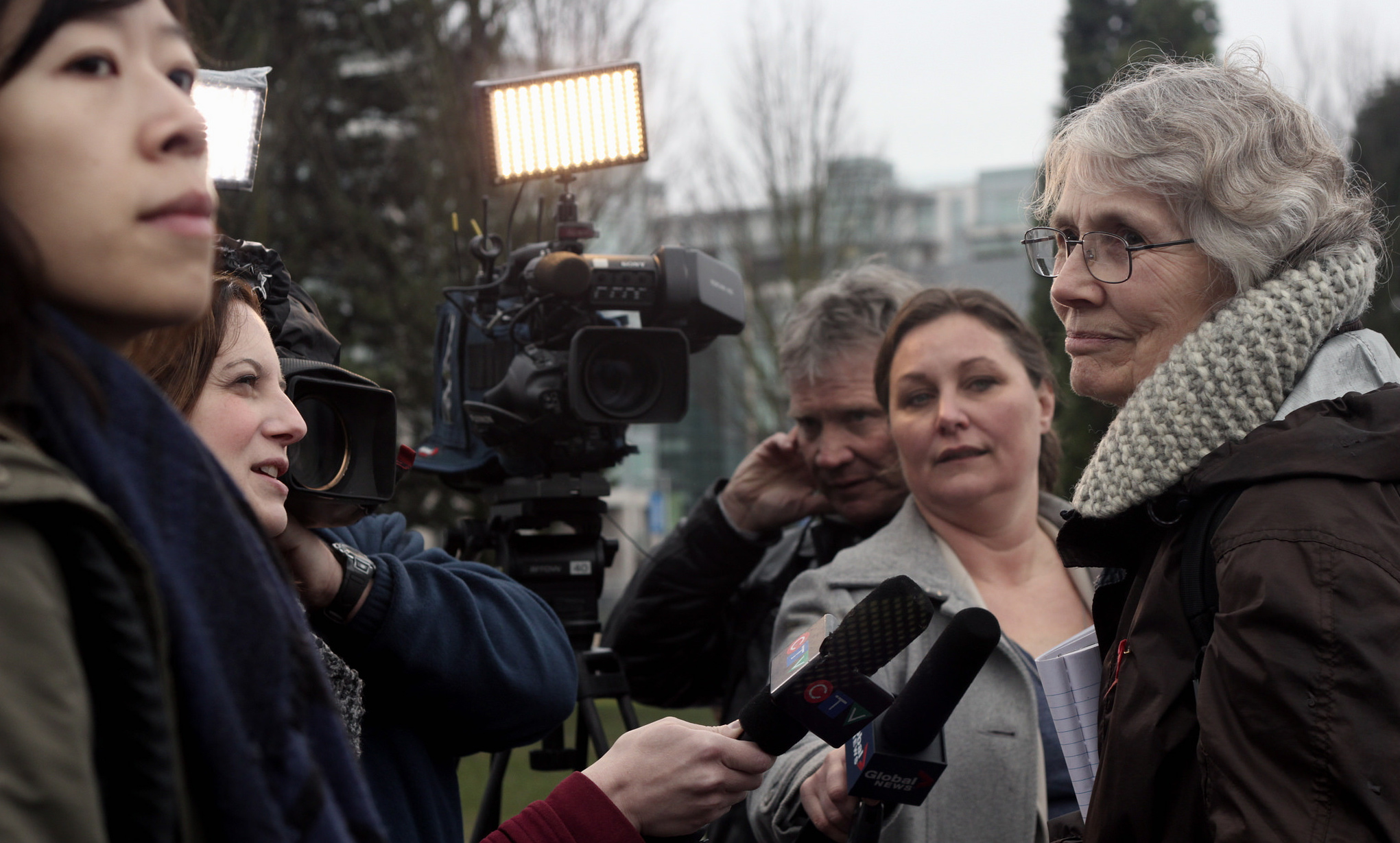Anti-poverty activist, Member of the Order of Canada, and Vancouver city council candidate Jean Swanson was sentenced to seven days in jail for defying a court injunction banning protesters from the Trans Mountain pipeline extension construction site on Burnaby Mountain.
Swanson pleaded guilty to criminal contempt of court, and was sentenced along with six other protesters, including dramaturge Kathleen Flaherty, and Susan Lambert, former president of the B.C. Teachers’ Federation.
Speaking to some 100 supporters who showed up for the trial, Swanson explained: “Laws can be bad. Laws permitted slavery. Laws permitted the theft of Indigenous land. The laws that led the Trudeau government to buy this pipeline are bad laws.”
The over 200 people arrested for opposing the Trans Mountain pipeline expansion are protesting dubious laws that encourage resource extraction and shipment because they believe these laws to be dangerous to human existence. Appealing to reason as the source of justice — as against obeying whatever rules and regulations have been set out by established authorities — has a proud lineage in left political history and thought.
The nonviolent resistance practices of Mahatma Gandhi were widely embraced by popular movements for justice that flourished in the postwar world by the 1960s.
Anti-Vietnam war activists, prominent U.S. civil rights proponents, feminists, environmentalists and many others faced power imbalances incorporated in unjust practices supported by police, the judiciary, and embodied in legislation, laws and other rules.
To do nothing is not an option; laws that are wrong need to be contested. For many years, Jean Swanson headed End Legislated Poverty, an organization founded to overturn welfare laws that sentenced citizens to live in poverty with woefully insufficient welfare income.
In The Wretched of the Earth, physician Franz Fanon argued that violence was acceptable if necessary to defeat decolonization.
In liberal democracies where the state holds the monopoly on violence, police power has regularly been used to intimidate dissidents and stifle dissent.
In Canada, successive governments have systematically contravened solemn treaty promises and repressed Indigenous rights.
Speaking at the sentencing, Susan Lambert said: “It is my conviction, and I suspect everyone’s in this courtroom, that scientists and our First Nations people are right. Emissions from the use of fossil fuels are harming our planet to the point of no return.”
Lambert pointed out that those activists found guilty — including the five women, who after sentencing would be held in a cold room in the basement of the courthouse, then shackled and transported for hours across the lower mainland to a women’s correctional facility in Maple Ridge, where they would arrive at 9 p.m. — were in fact political prisoners, not criminals.
For activists, the distinction between what is true and requires action in pursuit of justice, and what prevails in law, is fundamental to politics and social change.
Laws codify dominant practices and legitimize existing power structures. Activists cannot get court injunctions; corporations can call upon the state to protect their assets.
Justice demands that threats to planetary life and human dignity be identified, and be addressed and dealt with by governments and civil society.
Recent evidence from Montana confirms that widespread fracking threatens the U.S. ground water supply. Methane gas emissions such as those from uncapped Canadian gas wells represent a present danger for global warming. Methane gas “is 25 times more potent in trapping heat in the atmosphere than carbon dioxide.”
No legislation protecting private property rights can overturn the laws of nature. The B.C. government sees protection of coastal waters and marine life from oil tanker traffic as a provincial responsibility. It has initiated studies of bitumen spills recommended by the Royal Society of Canada. Environmental activists expect the John Horgan NDP government to base policies on science.
The Crown prosecutor argued Swanson and other protesters should receive jail sentences as a deterrent to future action in defence of the environment. The precedent was jail terms for the 900 Clayoquot Sound protesters arrested for participating in the 1993 War in the Woods, the largest civil disobedience action in Canadian history.
In her remarks, Swanson pointed to another precedent: the Clayoquot protests were successful in stopping clear-cut logging.
Opposition to fossil fuel expansion is not going away. The Trudeau cabinet meets in Nanaimo August 21-23. When the prime minister hosted a town hall in the Vancouver Island city last February, he faced some stiff criticism from the assembled citizenry.
In the months leading up to the October 2019 election, the 18 B.C. Liberal MPs are going to have to face questions to which their talking points have no valid answers.
No amount of green washing of pipeline expansion is going to succeed in diverting attention from the need for coastal protection. Decades of recent history suggests further imprisonment of environmental activists will mainly serve to grow visible opposition, educate public opinion, and, eventually, weaken government resolve.
Duncan Cameron is president emeritus of rabble.ca and writes a weekly column on politics and current affairs.
Photo: Tamara Herman/Flickr




